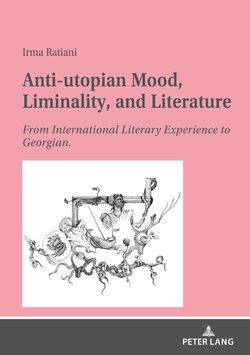Anti-utopian Mood, Liminality, and Literature

Реклама. ООО «ЛитРес», ИНН: 7719571260.
Оглавление
Irma Ratiani. Anti-utopian Mood, Liminality, and Literature
Anti-utopian Mood, Liminality, and Literature. From International Literary Experience to Georgian
Отрывок из книги
Irma Ratiani
Irma Ratiani is a Georgian scholar and translator. She is a professor at Ivane Javakhishvili Tbilisi State University (Georgia) and the chair of the Department of General and Comparative Literary Studies. She is a director of Shota Rustaveli Institute of Georgian Literature and Honorable President of Georgian Comparative Literature Association (GCLA).
.....
The main aim of Aristophanes in the plays listed above is to achieve ideal, harmonious and utopian society, which can be proved on the example of the author’s sympathy toward the program of Praxagora (“Women in Tents”), the actions of Plutus (“Plutus”) and the ideal city in the sky (“The Birds”). But at this stage our main sphere of interest is not the final result of the author, but the main process of achieving this aim: Aristophanes, on one hand, strives to achieve order, but, at the same time, appears to be a rebellious thinker against order. Anti-utopian motif here is a relevant concept of “undesirable reality” and has the meaning of “bad”, whereas the utopian motif “desirable reality” is the same analogous model of “good”. The anti-utopian text – Aristophanes’ political satire, directed toward statesmen, any type of criticism of dishonesty or a reflection of realistic manner – in this case, the primary structure is a basis on which the utopian text should be placed as a secondary structure, or the additional one.
The symbiosis of unity between utopia and anti-utopia can be seen in Lucan’s satirical texts as well, although it is more or less isolated in this very case. The criticism of reality, which includes the flagellation of existing religious dogmas, philosophical schools and social rules, is accompanied by sharp criticism of the Hellenistic utopian model, as a popular dream. But the images depicting ideal being are so persuasive that they had a great impact on the utopists of the Middle Ages.
.....